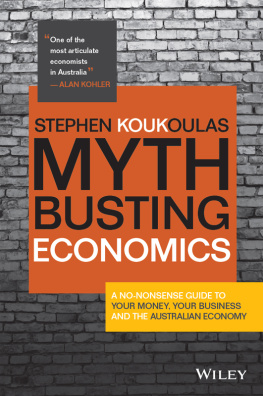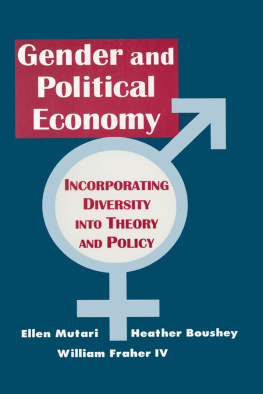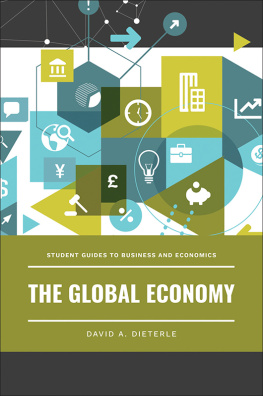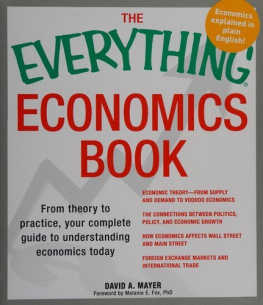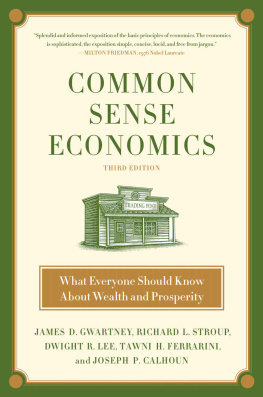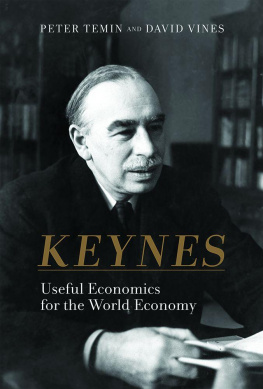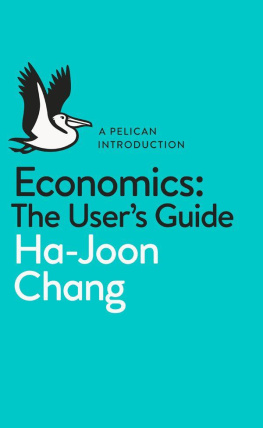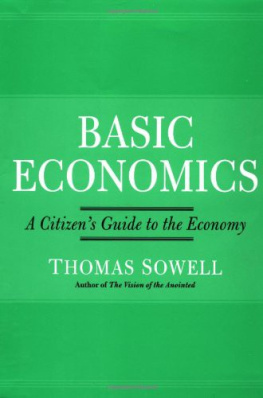There are countless people who have made this book possible by either contributing ideas, helping me to better understand how our economy works, or simply listening to my incessant tirades about the economy and (through their expressions) forcing me to be more succinct and coherent. They range from co-workers at my fathers Met Foods Store in Brooklyn to students at NYU and the Lander College for Men. I have been fortunate to know so many interesting and helpful people in my life, and I could not be more grateful for that.
There are a few people who directly helped to create this book. Grace Layer meticulously edited multiple drafts of the manuscript, and without her help this book would not have been possible. Grace is a true editing prodigy. Michael Goodwin, the author of Economix, also went through the manuscript word by word and helped me make my points more balanced and compelling. David Berman, my spouse, carefully reviewed the entire manuscript. As helpful as his comments were, our countless discussions of many of the ideas in the book were indispensable in enabling me to put them into written form. Antoine Martin of the Federal Reserve Bank of New York reviewed the sections of the book regarding the Fed and provided many essential comments on its operations. Finally, my editor, Jake Bonar of Prometheus Books, could not have been more helpful. He was the last to review the manuscript and still managed to find many ways to improve it.
This book would not have been published without the efforts of my agent, Susan Schulman. I am deeply indebted to her for taking on a book by a first-time author on a subject that is not known for its marketability. I also thank Linda Migalti, her rights director, for handling the audio and foreign rights.
Several friends also helped to make this book possible. Sari Locker helped turn my ideas into a formal proposal, and without it I would not have had the benefit of Susans representation. Becky Givan provided critical information and advice about publishing at the beginning of this process, when I needed it most. Ryan Senser helped me brainstorm ideas that resulted in the final title and subtitle. I am thankful to them and to all my other friends and family who provided so much support and encouragement.
The inherent vice of capitalism is the unequal sharing of blessings; the inherent virtue of socialism is the equal sharing of miseries.
CAPITALISM, SOCIALISM, OTHER ISMS, AND REALITY
What do Helen Keller, Adolph Hitler, Oscar Wilde, Joseph Stalin, and Nelson Mandela have in common? They all called themselves socialists. Meanwhile, former president Donald Trump, who broke all conventions and radically departed from the status quo, is called conservative; people who fault the media for not sticking to the truth are called liberal; and sycophants who make a living by cozying up to politicians are called capitalists. Clearly, many of the key terms used to describe economic and political systems have lost their meanings. Labels like capitalist and socialist have become so distorted and politicized over time that they serve more often as insults than as a succinct and accurate summary of someones worldview. Therefore, they arent particularly useful in helping us to look fairly and objectively at our economic system and gain insight into how it actually works.
In order to start understanding the economy, we need to begin with the most fundamental economic questions: Who gets what? and Who does what? Today, with so much stuff to allocate (such as cars, phones, college educations, and books on economics) and so many things to do (such as building cars, assembling phones, teaching, and writing books on economics), countless decisions have to be made. How can we make these decisions?
On one hand, these decisions could be made collectively by the government. In this scenario, the government owns everything and makes all the decisions. It decides how much food to produce (and who produces it) and how much coal to mine (and who mines it). It decides who gets the mansion on the coast and who gets stuck with a cramped apartment near the factory. Karl Marx wrote about this collectivist system, which is often summed up as from each according to his ability, to each according to his needs. This system is similar to communism and Marxism, as defined in textbooks.
On the other hand, these decisions could be made individually. In this scenario, everything is privately owned. Each person is free to do whatever they want with their time and resources. Clearly, these decisions are linked, since what you choose to do with your time greatly affects how much you can afford to buy and vice versa. But the government has no, or a very limited, role in these decisions. In the extreme version of this system, government doesnt even exist. In the less extreme version, the government has a limited ability to intervene if your actions cause direct harmlike if you pollute the environment, make hazardous products, or decide to practice medicine with no medical knowledge. This system is similar to libertarianism and laissez-faire (French for let it be), as defined in textbooks.
You can think of all economic systems that actually exist in the real world as being located somewhere along a spectrum between these two extremeswhere decisions are made collectively (on the left side) to where decisions are made individually (on the right side). So, what kind of economic system is capitalism?
The textbook definition of capitalism is an economic system where businesses (the means of production) are owned and managed by private individuals, rather than collectively by the government. The United States and most Western nations are often called capitalist, yet they fail to meet this definition since their businesses fall far short of being truly owned and managed privately. These nations regulate how, what, where, and by whom products are produced; serve as a partner in every business through the income tax system; directly produce and provide a variety of goods and services from education to housing to food; decide whether businesses can merge with or acquire their competitors; and control how employees can be treated and paid. Any system that permits completely free and unfettered private control of business and fully meets the textbook definition of capitalism would lack the ability to protect consumers from being cheated, the environment from harm, and workers from being exploited. It could not be successful in the real world.
Conversely, every communist nation, including North Korea, has some private enterprise and therefore meets the definition of capitalism to some extent. In particular, Communist China has innumerable entrepreneurs, some of whom have become multi-billionaires by building successful businesses. Why do all nations have at least some form of private enterprise? If the government owned and controlled all production, it would have to figure out what each person needed, how to produce all of it, and what each persons contribution to that production would be. Furthermore, in a system where the needs of all people are met, regardless of what they do or dont do for work, motivating each person to do all the tasks necessary to make that possible would be difficult, to say the least. The level of government control in such a system and the ethical and logistical issues of getting everyone to do what the government needed them to do are unimaginable. It would be just as unworkable as a system in which there is no role for government and collective action.
Therefore, what we have in the real world today is a hybrid system. On one hand, businesses in the vast majority of nations are rarely owned and controlled by the government. On the other hand, the legal system and the governments countless rules, restrictions, and incentives greatly influence what businesses produce and how they produce it.


